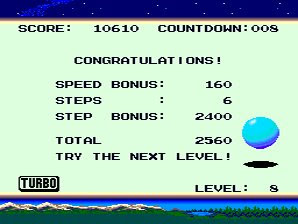Manuel Constantinidis/Hudson Soft - 1990 - U.S.A.
HuCard
HuCard

"Well, at least it's better than Blodia."
"That game sucks worse than Blodia! A rare achievement indeed!"
Etc.
And for what? Is Timeball really the epitome of all that was awful and putrid during the 16-bit era? In a word: no.
Those out there who know me know that I'm a sucker for a good puzzle game. And while I'd be going out on a limb by saying that Timeball classes with the best of 'em, it's many times removed from the worst of 'em.
So just what is it about Timeball that evokes such raw hatred from everyone? I've observed a definite correlation in the video game universe that ties a given title's difficulty with how much the average schmuck dislikes it. The harder the game, the "worse" the game. Case in point: Altered Beast. Deep Blue. Shape Shifter. Ghost Manor. I could go on and on. I've come to the conclusion that people in general like games that stick to a preconceived "norm" and any deviation beyond that realm just plain befuddles these clowns.
If this is truly the gauge of a game's greatness, then Timeball is guilty as charged. The goal of the game is to allow a glass ball to succesfully navigate a pipeline from beginning to end. Sounds simple enough, and it is. Except.... every pipeline has been "shuffled" so that you have to put it back together in the correct sequence or your ball will fall and shatter on the ground. The puzzles start out very simple but it won't be long before you're scratching your head.



Timeball's biggest (only?) pitfall is the monotony that will inevitably ensue after you've been playing it for extended periods. Timeball is best played occasionally, in relatively short spurts. This should be no problem since the game will save your progress and high score table as you advance. There are 100 different boards total, and believe me, it will take many hours to see them all.
If you're like me and puzzle games appeal to you, or you're the kind of person who likes to sit down with a crossword or mind puzzle book every now and then, you'd probably do OK to nab a cheap copy (and it is cheap) of Timeball and give it a spin. You sure could do a lot worse.

1 comment:
Blodia sucks!
Post a Comment